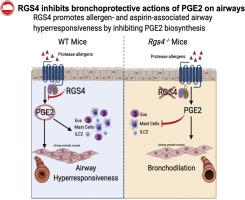Journal of Allergy and Clinical Immunology ( IF 14.2 ) Pub Date : 2020-03-19 , DOI: 10.1016/j.jaci.2020.03.004 Gordon S Wong 1 , Jamie L Redes 1 , Nariman Balenga 1 , Morgan McCullough 1 , Nathalie Fuentes 1 , Ameya Gokhale 2 , Cynthia Koziol-White 3 , Joseph A Jude 3 , Laura A Madigan 1 , Eunice C Chan 1 , William H Jester 3 , Sabrina Biardel 4 , Nicolas Flamand 4 , Reynold A Panettieri 3 , Kirk M Druey 1

|
Background
Allergens elicit host production of mediators acting on G-protein–coupled receptors to regulate airway tone. Among these is prostaglandin E2 (PGE2), which, in addition to its role as a bronchodilator, has anti-inflammatory actions. Some patients with asthma develop bronchospasm after the ingestion of aspirin and other nonsteroidal anti-inflammatory drugs, a disorder termed aspirin-exacerbated respiratory disease. This condition may result in part from abnormal dependence on the bronchoprotective actions of PGE2.
Objective
We sought to understand the functions of regulator of G protein signaling 4 (RGS4), a cytoplasmic protein expressed in airway smooth muscle and bronchial epithelium that regulates the activity of G-protein–coupled receptors, in asthma.
Methods
We examined RGS4 expression in human lung biopsies by immunohistochemistry. We assessed airways hyperresponsiveness (AHR) and lung inflammation in germline and airway smooth muscle–specific Rgs4−/− mice and in mice treated with an RGS4 antagonist after challenge with Aspergillus fumigatus. We examined the role of RGS4 in nonsteroidal anti-inflammatory drug–associated bronchoconstriction by challenging aspirin-exacerbated respiratory disease–like (ptges1−/−) mice with aspirin.
Results
RGS4 expression in respiratory epithelium is increased in subjects with severe asthma. Allergen-induced AHR was unexpectedly diminished in Rgs4−/− mice, a finding associated with increased airway PGE2 levels. RGS4 modulated allergen-induced PGE2 secretion in human bronchial epithelial cells and prostanoid-dependent bronchodilation. The RGS4 antagonist CCG203769 attenuated AHR induced by allergen or aspirin challenge of wild-type or ptges1−/− mice, respectively, in association with increased airway PGE2 levels.
Conclusions
RGS4 may contribute to the development of AHR by reducing airway PGE2 biosynthesis in allergen- and aspirin-induced asthma.
中文翻译:

RGS4 通过抑制 PGE2 生物合成来促进过敏原和阿司匹林相关的气道高反应性。
背景
变应原引起宿主产生作用于 G 蛋白偶联受体以调节气道张力的介质。其中包括前列腺素 E2 (PGE2),它除了作为支气管扩张剂外,还具有抗炎作用。一些哮喘患者在摄入阿司匹林和其他非甾体抗炎药后会出现支气管痉挛,这种疾病被称为阿司匹林加重呼吸系统疾病。这种情况可能部分是由于对 PGE2 的支气管保护作用的异常依赖所致。
客观的
我们试图了解 G 蛋白信号传导调节剂 4 (RGS4) 的功能,RGS4 是一种在气道平滑肌和支气管上皮中表达的细胞质蛋白,可调节哮喘中 G 蛋白偶联受体的活性。
方法
我们通过免疫组织化学检查了人肺活检中 RGS4 的表达。我们评估了生殖系和气道平滑肌特异性Rgs4 -/-小鼠以及用烟曲霉攻击后用 RGS4 拮抗剂治疗的小鼠的气道高反应性 (AHR) 和肺部炎症。我们通过用阿司匹林挑战阿司匹林加重的呼吸系统疾病样 ( ptges1 -/- ) 小鼠,研究了 RGS4 在非甾体抗炎药相关支气管收缩中的作用。
结果
在患有严重哮喘的受试者中,呼吸上皮中的 RGS4 表达增加。过敏原诱导的 AHR 在Rgs4 -/-小鼠中意外减少,这一发现与气道 PGE2 水平增加有关。RGS4 调节人支气管上皮细胞中过敏原诱导的 PGE2 分泌和前列腺素依赖性支气管扩张。RGS4 拮抗剂 CCG203769 分别减弱了由过敏原或阿司匹林激发的野生型或ptges1 -/-小鼠引起的 AHR ,这与气道 PGE2 水平增加有关。
结论
RGS4 可能通过减少过敏原和阿司匹林诱导的哮喘中气道 PGE2 生物合成来促进 AHR 的发展。



























 京公网安备 11010802027423号
京公网安备 11010802027423号